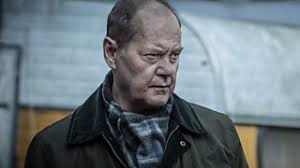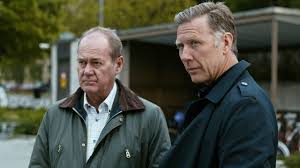Beck (1999+ )
TVDB meta-data is runtime 90 minutes each in 42 episodes, rated 7.4 by 4232 cinematizens.
Genre: Police procedural.
Verdict: Low key.

Good cop, bad cop, and many others. Martin Beck is slow and careful while his off-sider is mercurial and trigger happy. Sounds clichéd because it is, but it works in small doses in this long-running series from Sweden. How many Swedes are left after the body count in each episode? The first I watched had six deaths, and a lot of guns. More violent and gruesome than I like, but low key in that the characters to do not yell at each other, as is so common in Yankee krimis, mistaking noise and guns for drama.
There is usually a lot of out and about in Stockholm for eye candy, and a lot of use of drones. My two brief visits to Stockholm consisted mainly of hotel rooms, conference tables, meetings, and reports, leaving me with little idea of its geography of the many islands and bridges.
The plots involve biker gangs, Russian mafia, immigrant vendettas, corporate corruption, and the usual vices of screenwriters: drugs, money, and prostitution. That dearth of narrative originality is offset by the production that makes much use of expensive location shooting (from public parks, pleasure boats, old churches, bars clubs, glitzy corporations, and more) and nearly everyone in Sweden appears on camera as an extra. However, the repertoire company of leading actors from Sveriges TV is so small I recognised a good many of them from other roles. Still, the acting is superb, especially from the inner circle of coppers. A flicker in eye, a purse of the lip, a twitch of the shoulder tells much in these intense productions. No Yankee yelling is needed, nor any of the sanctimonious speeches common in Brit TV. Instead Beck sighs, and moves on.

There is some light relief from Beck’s intrusive, genial, and persistent neighbour, Grannen who gives Beck the benefit of his advice on alcohol, women, sports, dining, travel, and more when they meet in the elevator, hallway, lobby, or adjacent balconies of the apartment building. As part of a mandatory staff development exercise, Beck was once required to write down the names of three people who mean a lot to him. The first two were easy: his daughter, and grandson, but it took him all day to realise the third was Grannen – the look on Beck’s face when he wrote that down is a treasured memory. Grannen is a Beck-opposite: extravagant, thoughtless, carefree, flamboyant, intrusive, daring….

Beck is played so low key at times he seems to be catatonic, whereas the hyperactive Gunvald is always ready, willing, and able to kick in a door, even if it leads to the toilet in police HQ. The man knows how to make an entrance. Beck, on the other hand, seems to suffer from low blood pressure and move ever so slowly. Indeed he has brandished a weapon only once in the ten episodes I have seen to date. He didn’t shoot…because Gunvald did it first — no surprise there.
Beck’s talents lie in managing the team of detectives and in interrogation where he is a hard man to fool. Don’t play poker with this man. He reads the tells very quickly. (If you don’t know what a ‘tell’ is, then don’t play poker with anyone.)
The stories are interesting but the resolution is often magic, making it more trip than arrival. However, they are strong on the motivations of characters and what a mystery that makes us to each other.
Some of the earlier episodes come from one of the ten-novel sequence of Maj Sjöwall and Per Wahlöö (1965-1975) whence Beck originated (though many other characters from the novels are omitted, notably Lennart Kollberg). But many of the episodes are not derived from that source, just as well, because I found the last five or six Sjöwall-Wahlöö novels suffocatingly preachy with ideology supplanting humanity as the soapbox came out and human interest waned. But speaking of soap, I have to say that the episodes after Gunvald was written out have tended toward soap operas with the backstories taking over in continuing and endless, pointless melodramas: Will Emma leave Oscar? Will quiet Jenny get a new hair style? Will work-alcoholic Ayda take a day off? Will loquacious Claes ever shut up? Stay tuned for these and other equally trivial problems.
Equally, in the latter episodes the boy toys get bigger and more prominent. Every five minutes Beck calls out the SWAT team to knock down doors, blow up rooms, and swarm over a place, usually too late to find anything. But the SWAT members put on a choreographed show.

Other films have been made from the novels, including an earlier Sveriges production Beck (1993) in nine episodes with a different cast, and also the feature films The Laughing Policeman (1973), The Man on the Roof (1976), The Man Who Went up in Smoke (1980), and Roseanna (1967). This last film was based was the first novel of the series and is a personal favourite out of the ten books. The film version of The Laughing Policeman is set in San Francisco with Walter Matthau as the Beck substitute and loses everything in the transition, while The Man Who Went up in Smoke is an English production with a woefully miscast Derek Jacobi as Beck.

